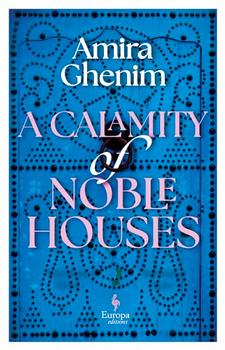Summary | Excerpt | Reviews | Beyond the Book | Readalikes | Genres & Themes | Author Bio

I flew across the courtyard like an untamed filly toward Lella Zbaida's room, but a light rain had fallen in the night and left the smooth floor wet and slick, so I had to slow down to avoid slipping. As I neared the covered stairs leading to the upper floor, Sidi Mohsen came out onto the balcony overlooking the courtyard, wearing his burgundy burnous. When he saw me, he gave me a sign with his hand, reassuring me that your grandmother and her newborn were fine, then sent me down to the storage room to bring him the skeleton key. I realized that Lella Zbaida's seizures must be back. We'd almost forgotten this old affliction of hers. We all thought it had been cured, thanks to Lella Bashira's offerings at the shrine of Lella Aisha Al-Manoubya and the animals she sacrificed at the shrine of Sidi Mehrez.
I remember the first attack as if it were yesterday. (Yes, Hind, the memory of this old woman—the one your father, God rest him, left you the responsibility to bury—is still sharp! The years may have taken her eyesight and sapped the strength from her legs, but she can still remember every detail of past events. How strange, though, that she can recall ancient history but not, in the morning, what she ate the night before!) That day, your great-grandmother, Lella Bashira, was busy distill¬ing sweet geranium water, atarchya, with Hedda. Hedda was a skilled woman, always in demand among upper-class Tunisian ladies for her expertise in making and preserving all kinds of provisions. Remember that back then, you couldn't just buy unflavored couscous and mhamsa in plastic packages at the store, like you can nowadays; you couldn't buy spices that were already prepared and ground for you. Instead, every season had its own provisions to be prepared and added to the pantry in rich people's homes. Spring was the season of distilling orange blossoms, sweet geranium, native roses, sweet briar, and other fragrant plants.
The task for someone my age then was to take the glass fechka from Hedda's hand when it was full and plug it up with a special piece of cloth, to make sure it was airtight and that none of the fragrant scent was wasted. This was toward the be¬ginning of my time living in Lella Bashira's house, and I hadn't yet acquired the knowledge and skills of the city dwellers, so I sat gaping like an idiot at the drops streaming from the spout into the neck of the fechka. I had no understanding of how the cold water that Hedda was pouring into the upper part of the alembic was transformed into that warm liquid with its greasy top layer that looks like oil but isn't, and which filled the house with its sweet scent.
Lella Zbaida was a few years older than me and was busy chasing bees away from the piles of geraniums that had been brought from the souk by Sidi Hajj Ali's porter. They were heaped high next to Hedda, waiting their turn to be boiled in the bottom part of the alembic, which was sitting atop a crack¬ling fire. I got bored waiting for "the head"—what people in the city call the first distillation—so I decided to help Lella Zbaida. I alerted her to any bees hiding between the green leaves and in¬side the small purple flowers of the sweet geranium. We would laugh whenever we found one.
Suddenly, Lella Zbaida shrieked, just like on that fate¬ful dawn, then fell to the ground, staring without seeing, her body shaking. Lella Bashira jumped up in shock, knocking the alembic and its contents to the ground without noticing. I can still hear the alembic's terrifying blast as it echoed through the kitchen, and smell the sweet scent emanating from the water that streamed from its many holes.
Lella Bashira searched the uncovered parts of the young woman's body for the bee sting she thought at first had caused the attack. She thought it must have been a poisonous sting by a queen bee, but when she didn't find a mark and realized that Lella Zbaida was still shaking, she looked at me with sudden understanding. She asked me, sharply, "What on earth did you do to her, you damn girl?"
Excerpted from A Calamity of Noble Houses by Amira Ghenim. Copyright © 2025 by Amira Ghenim. Excerpted by permission of Europa Editions. All rights reserved. No part of this excerpt may be reproduced or reprinted without permission in writing from the publisher.
A classic is a book that has never finished saying what it has to say
Click Here to find out who said this, as well as discovering other famous literary quotes!
Your guide toexceptional books
BookBrowse seeks out and recommends the best in contemporary fiction and nonfiction—books that not only engage and entertain but also deepen our understanding of ourselves and the world around us.